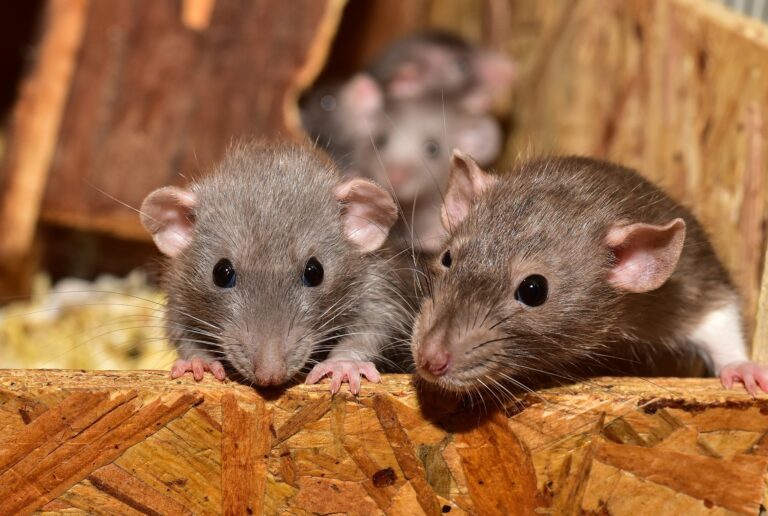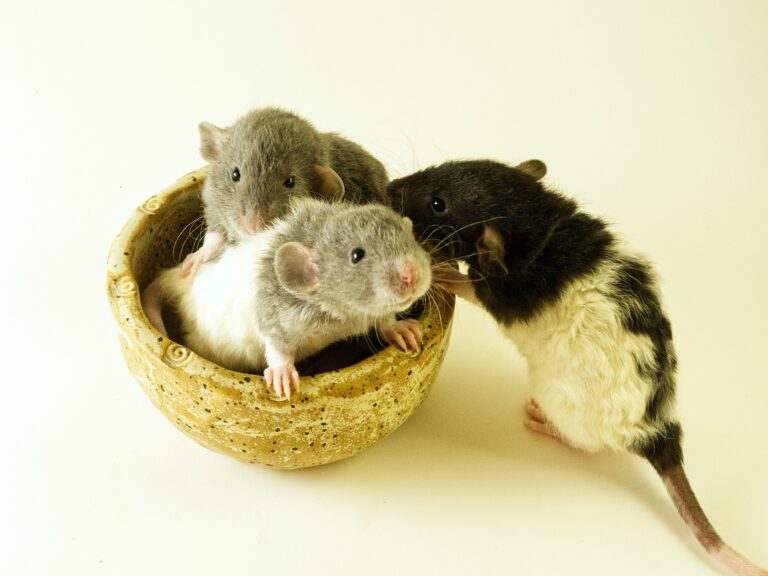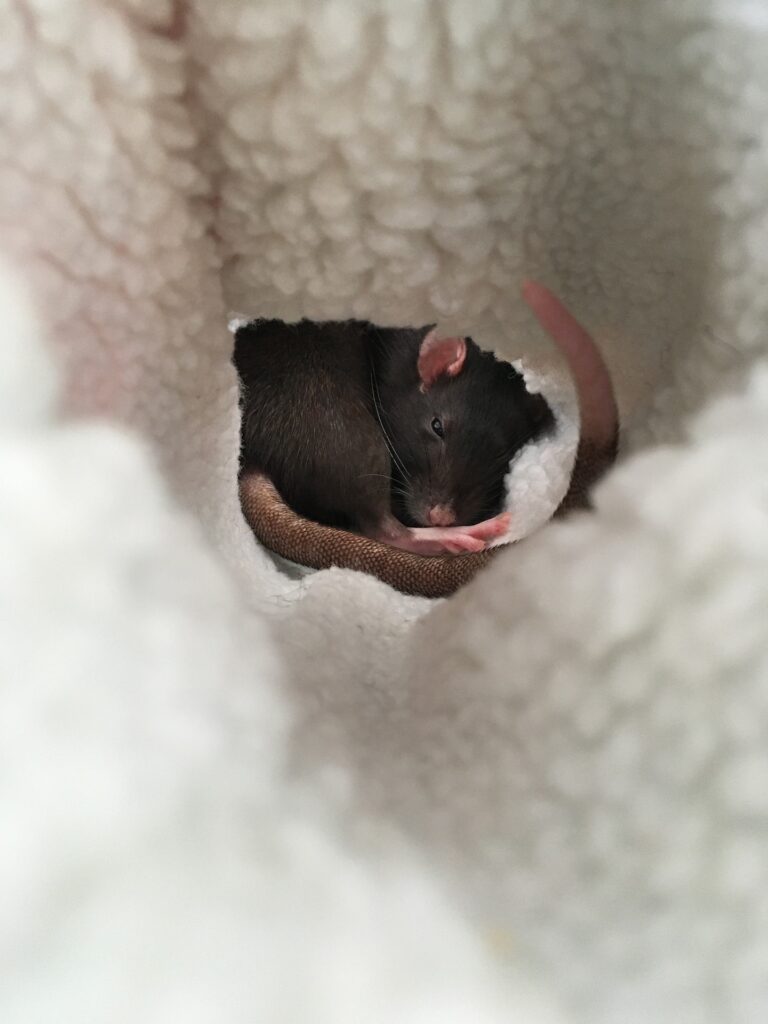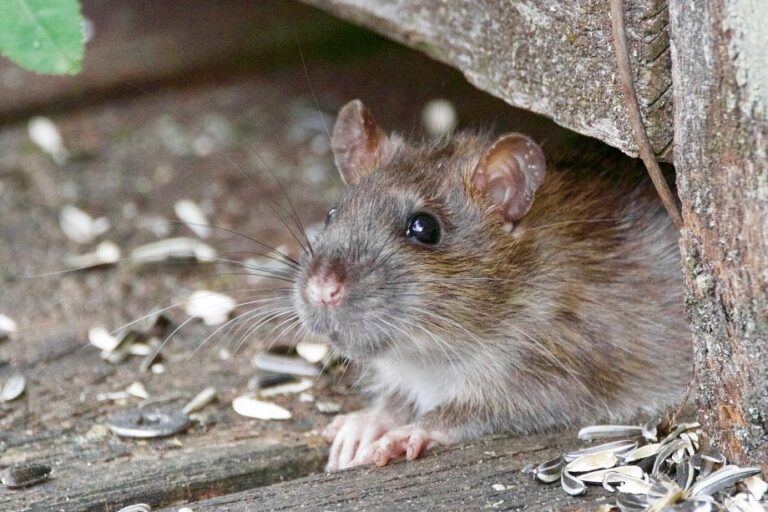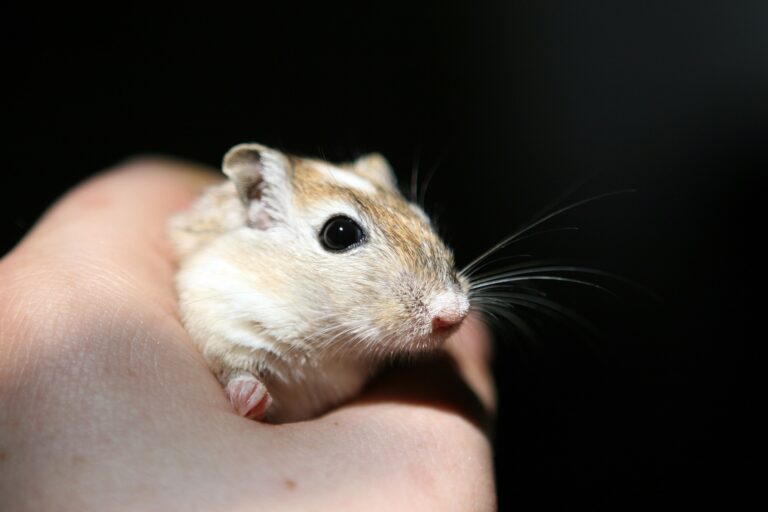Do Pet Rats Bite Humans? (And How to Make Sure They Don’t)
A pet rat can be a surprisingly loving friend. However, if you are in the market for one, you are probably wondering if there is a risk of getting bitten.
Pet rats do not bite in normal conditions. A rat may bite due to fear, hormonal changes, illness or injury, or startling. Generally, however, pet rats don’t like biting people. Treat your rat well & it will return the favor.

Reasons a Rat Might Bite You
Pet rats are pretty unlikely to bite people. However, if your new pet rat does bite you, then there’s a genuine reason, or something could be wrong.
In such cases, there could be both biological and behavioral reasons:
Biological Reasons
These occur naturally, and they include the following:
1. Fear
Fear is the main reason for pet rat bites. While in the wild, rats occupy the lowest part of the food chain. Like any animal, self-protection is the first instinct for rats when afraid. That’s why they’ll aggressively attack people with their teeth.
Some rats may develop fear from the start of their lives if not treated well. That’s most likely the case of rats bred for food. The rat’s interactions and socialization with other rats can also cause fear.
If a pet rat is treated badly it will become very scared of humans. Since we are bigger than them, they’ll try to protect themselves by biting you.
2. Changes in Hormones
Male pet rats may start biting due to hormonal changes. As they mature, they become more aggressive to humans. This makes them very territorial, and they will start acting aggressively towards their cage mates and their owners.
It is natural to see rats fight amongst themselves. You may see them in little scuffles that often look like a fistfight.
However, it becomes unusual when you see blood dripping from their cage mates. Or when they start becoming territorial and even bite you when you make contact with their cage.
3. Pain, Injury, or Illness
When your lovely pet rat starts to bite you suddenly, it could be in pain, sick, or injured. In such cases, they may feel uncomfortable being handled.
They could also feel vulnerable and scared. This makes them bite you in the name of self-protection. Unfortunately, such behavior is often common with other pets such as cats and dogs.
4. Playing/Nibbling
Pet rats tend to like feeling things using their teeth. For instance, if you place your hand inside their cage, they’ll start nibbling on your fingers lightly. To them, this behavior is about exploring the new thing without the intention of hurting you.
Your pet rat might also chew on items such as jewelry, Band-Aids, or fingernails. All of these are harmless, and they try to groom you as they enjoy themselves.
5. Getting Startled
Grabbing your pet rat suddenly from above could startle it. And it may bite you. Naturally, rats are prey animals. In this case, they use their instinct to bite you.
That’s because grabbing them suddenly makes them scared. According to them, biting whatever is grabbing them is their only way of getting free. So, if your rat doesn’t see your hand coming to hold them, they’ll not know it is you.
6. Pink Eye
Pet rats with pink eye usually have poor eyesight. Therefore, they won’t detect a person approach them. They easily become frightened, as it feels to them that you are sneaking up on them. And they’ll bite you to protect themselves.
7. Keen Hearing
Rats’ ears are incredibly sensitive to loud sounds. Thus, rats perceive constant music, a sudden burst of loud noises, or other jarring sounds as a threat and unpleasant. Such an environment makes the rat active and ready to strike-bite as a self-protection mechanism.
Behavioral Response
Rats are not naturally born ready to attack people. Any aggressive behavior they may have towards people could have been learned for self-preservation. A pet rat can bite you due to the following behavior responses:
1. Being unfamiliar with Human Contact
If it’s the first time your rat is around people, it could easily bite. That’s because the rat isn’t used to being petted or held. It can take a significant amount of time for the rat to learn positive association upon human contact.
2. Territorial Response
Your rat may feel safer while inside the cage. At the same time, the rat may not be familiar with humans. When the two combine, it could be more threatening for the rat to see your hand coming inside the cage to grab him.
3. Associating things with Food
Do you grab your rat while your hands smell food? Well, rats tend to smell the food scent on your hand and then think that your hand is the food. This makes the rat bite you. Speaking of which, read our article on whether or not you can feed your pet rat cheese.
Tips to Prevent Getting Bitten
Just like any vicious pet behavior, you can prevent pet rat bites. A pet bite can harm you emotionally and physically, causing bite fevers. Check out and try these tips to prevent being bitten by your pet rat.
Socialize your pet rat
This helps to make the rat aware and familiarize themselves with human contact. Be sure to take the process slow and try to spend a lot of time with your rat. Make sure the environment is free from stress.
Reward your pet with treats
Never let your rat sit back in the corner. Give your rat some treats to entice them to approach you. Let them come to their terms, and don’t show them that you’re afraid.
After some time, start scooping them to hold them. While inside the cage, grab your rat from the bottom. This way, the rat won’t easily get scared.
Manage hormonal aggression
Does your rat aggressively hurt their cage mates? Try to isolate them for the time being as you figure out the problem. You can place them in a neutral location. You can neuter them to control the hormonal aggression.
Don’t let your rat learn that biting you is the best way of keeping you out of their territory. Instead, take them to the veterinarian to determine the problem and administer drugs to help reduce their hormonal aggression. Treat your rat if they have any illness, pain, or injury.
Establish a boundary
Playing and nibbling are fun for pet rats. But if you feel uncomfortable, you must establish a boundary.
Use a high-pitch ‘ouch!’ sound to make them stop. This enables them to understand that they’re hurting you with their teeth.
Rats learn pretty fast. And since they don’t want to harm humans, they’ll stop their nibbling behavior.
Know how to deal with rats with pink eyes
As stated earlier, a rat with pink eyes has poor vision. If your rat has such eyes, talk to them softly as you move slowly towards them. This will make him aware that you’re not a predator who’s about to strike.
Train your rats for petting
A rat that’s new needs training; at first, place your hand in the cage without making close contact with the rat. Then, try to move your hand in their cage in a slow and friendly manner. Do so as you talk softly and in a reassuring way. Practice this for few minutes every day.
After some days, carefully move your hand closer without touching the rat. In a week, try to pet him gently and briefly. Then, start grabbing and holding him each day to build trust with you.
Wash your hands thoroughly before holding your rat
Rats have a sharp sense of smell. To prevent them from associating your fingers with food, it is essential to wash your hands thoroughly. Besides, place the treat or food on a flat, upward-facing palm. But not with your fingers.
Do Pet Rat Bites Hurt?
Rat bites really hurt. Rats have large teeth. When they feel threatened, they make several small cuts or a single puncture wound. These tend to bleed and even cause painful swellings. In fact, pet rat bites can cause serious tetanus infections and other hazardous diseases.
What Happens if a Pet Rat Bites You?
If a pet rat bites you, they leave a single or several shallow or deep puncture wounds on the skin. Sometimes, the bites may exist as multiple abrasions. These often result in bleeding and may cause painful swelling.
Infections are quite rare. However, some rat species’ saliva carries hazardous diseases like Hantavirus and leptospirosis. As a victim, you may face serious infections.
In rare cases, you may contract rat-bite fever, which usually causes rashes on your skin. The rash may have small bumps or be flat, with colors ranging from red to purple. It may, at times, look like bruising.
Signs and symptoms of rat bite fever
• Joint pains
• Chills and fever
• Headache
• Muscle pain
• Skin rash
• Vomiting and diarrhea
• Sore throat
• Swollen lymph nodes
• Wound ulcers
These symptoms are not always serious, and the bite may quickly heal. Yet, you can prevent rat-bite fever with ease.
Always thoroughly clean and disinfect the rat bite promptly. Dry the wound with a clean towel and smear a prescribed antibiotic ointment. Then cover it well using a clean bandage.
Go for tetanus immunization if you haven’t received them recently. More importantly, visit a doctor immediately, even if the bite seems minor. The bite must be properly treated to prevent infections which can cause severe health problems.
Final Thoughts
Pet rats do bite people due to either behavioral or biological reasons, or both. Regardless of the cause, it is important to understand the reasons why the pet is biting people. Once you know that, it becomes easier to help your pet rat avoid such vicious behavior.
With the above information, it’s clear that pet rats don’t like hurting people unless they have to. Use our tips above to prevent pet rat bites from evading some nasty infections the rats may be carrying.
